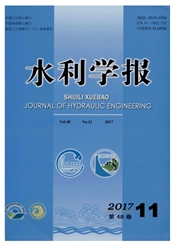

 中文摘要:
中文摘要:
冬季冰期水温的预报是冰情预报的基础。将基于自适应网络的模糊推理系统(ANFIS)和Levenberg-Mar.quardt算法改进的BP神经网络模型ANN应用到黄河冬季水温预报中,通过分析模型结构特性、水文数据及其相关预报因子的特点,确定模型合理的输入参数。在ANFIS和ANN模型输入因子和预见期相同的条件下,预报黄河最北端三湖河口、头道拐、巴彦高勒3个水文站冬季结冰期的水温。两种模型预报结果的优劣通过确定性系数、均方根误差和相关系数3种参数的比较进行评定。通过12组参数预报结果的比较和特性评定,自适应网络的模糊推理系统预报结果均比神经网络模型预报结果好。研究表明:基于自适应网络的模糊推理系统这一新的理论能够适合冬季结冰期水温预报的特点,预报精度得到普遍的提高。
 英文摘要:
英文摘要:
Forecast on freezeup water temperature is a basis for the ice condition. In this study, Adap tiveNetworkbased Fuzzy Inference System (ANFIS) and Artificial Neural Networks (ANN) are applied to the freezeup water temperature forecasting in the Yellow River. Reasonable input parameters of the two models are determined through analyzing each model characteristic, information of water temperature and re lated factors. For better comparability, the same input factors and forecast periods are used to estimate the 4year water temperatures in Bayangaole, Shanhuhekou and Toudaoguai hydrometric stations, which are lo cated in the most north of the Yellow River. The forecast results are assessed by coefficients of determina tion, correlation coefficients and root mean square errors. A comparison of ANFIS and ANN results shows that ANFIS gave better results than ANN by 12 forecast cases. As a result, ANFIS model is founds to be superior to ANN model for forecasting the time series information, such as freezeup water temperature.
 同期刊论文项目
同期刊论文项目
 同项目期刊论文
同项目期刊论文
 期刊信息
期刊信息
